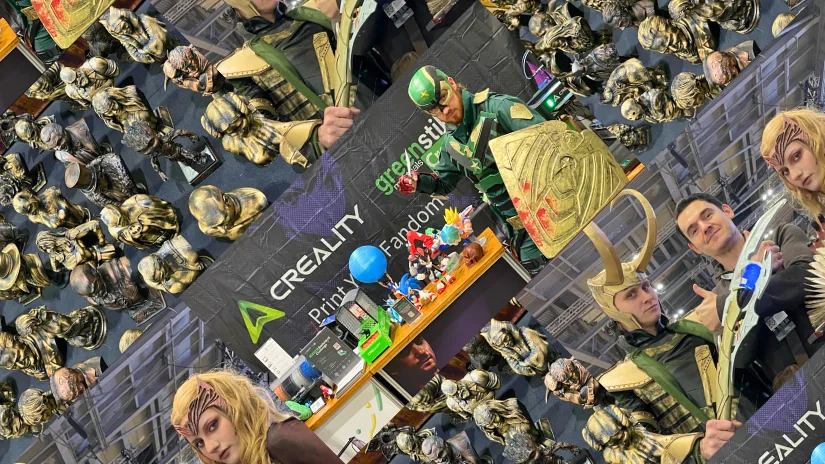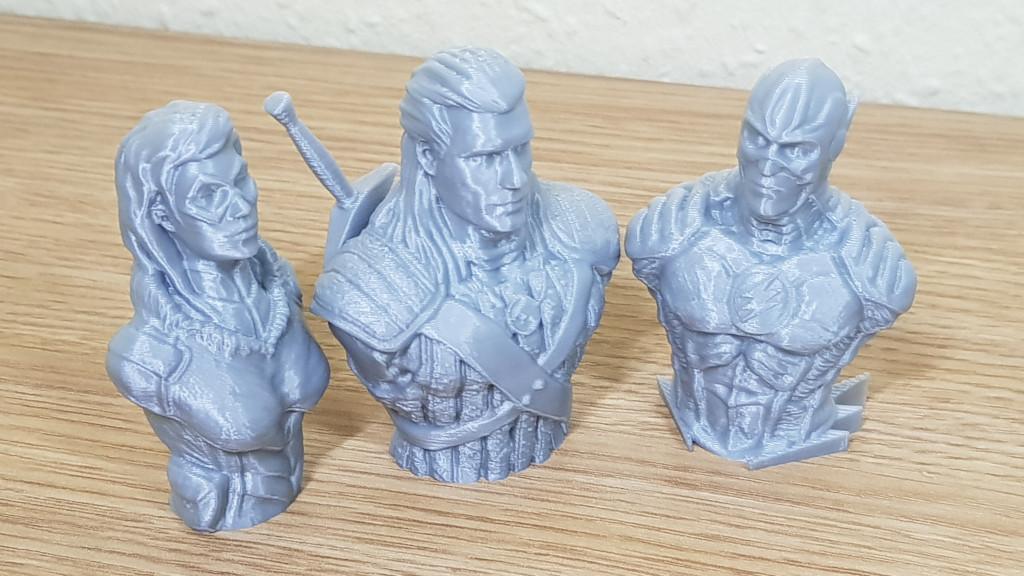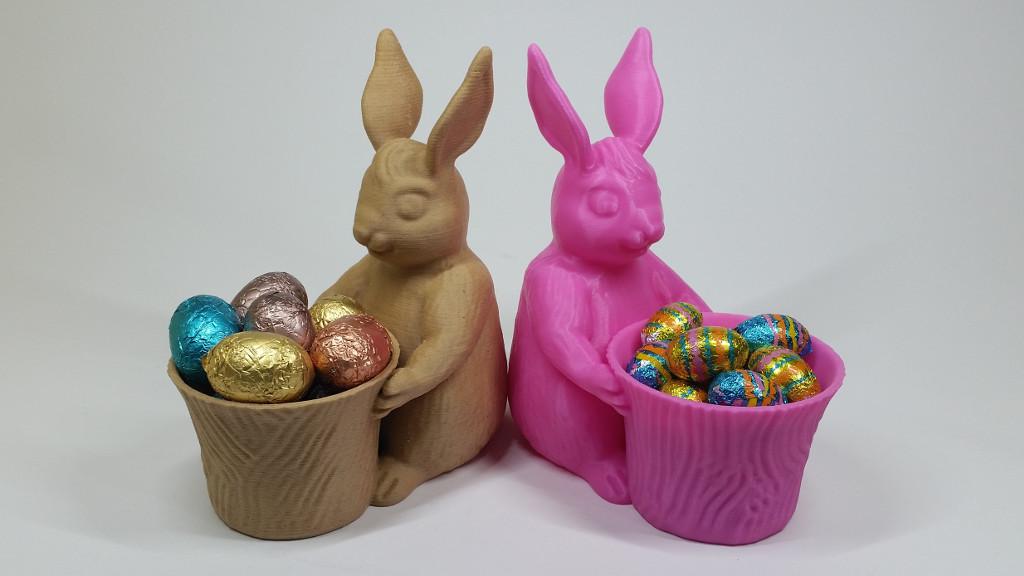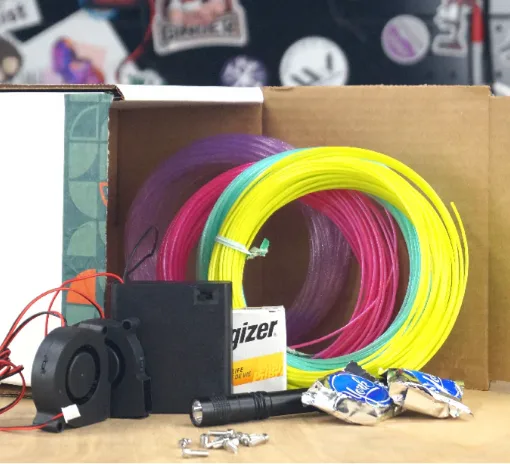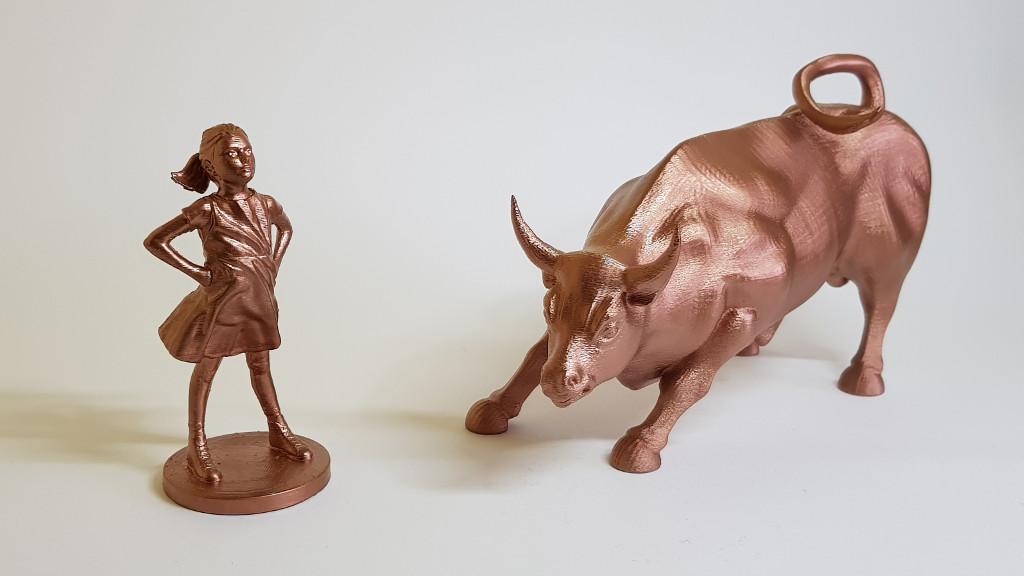Comic Con events around the world have become a vibrant celebration of fandom, creativity, and craftsmanship. Among the costumes, collectibles, and immersive displays, one technology continues to stand out is 3D printing. From designed cosplay armor and fan art busts to detailed tabletop figurines and display props, 3D printing plays a growing role in how makers, artists, and exhibitors bring their ideas to life. This guide explores how 3D printing powers Comic Con culture.
Table of Contents (Jump to a Section)
- From Comic Books to Cosplay Tech
- Fan Art and Figurines: From Merch to Props Stalls
- Behind the Scenes: Exhibitor Booth
- More About Cosplayers
- Comic Cons: When and Where
- Conclusion
From Comic Books to Cosplay Tech
Comic Con events have grown far beyond their comic book origins. What began decades ago as small gatherings for fans of comics and sci-fi has exploded into massive festivals of pop culture, gaming, cosplay, film, and fandom. Today, these events attract hundreds of thousands of attendees, and they offer a unique window into how creativity, technology, and community intersect.
Over the past decade, 3D printing has quietly become part of that area. At first, it appeared in the background, a few props here, a cosplay detail there. But as the technology became more accessible, especially with budget FDM and resin 3D printers, its presence on the convention floor grew. Today, you can find 3D printing in costumes, in artist booths, and in fan art collectibles. Based on my recent experiences as both a visitor and media guest at several Comic Con events, this guide explores how 3D printing is shaping the future of fan-driven creativity.
Fan Art and Figurines: From Merch to Props Stalls
One of the most visually striking parts of any Comic Con is the overwhelming variety of fan-made art and collectibles. From rows of painted figurines to vibrant display walls of custom prints, these booths often feel more like gallery exhibitions than simple merch stalls. Across the different Comic Cons I attended, it was clear that 3D printing, laser cutting, and hand-finishing techniques are now a major part of how creators bring characters and concepts to life.
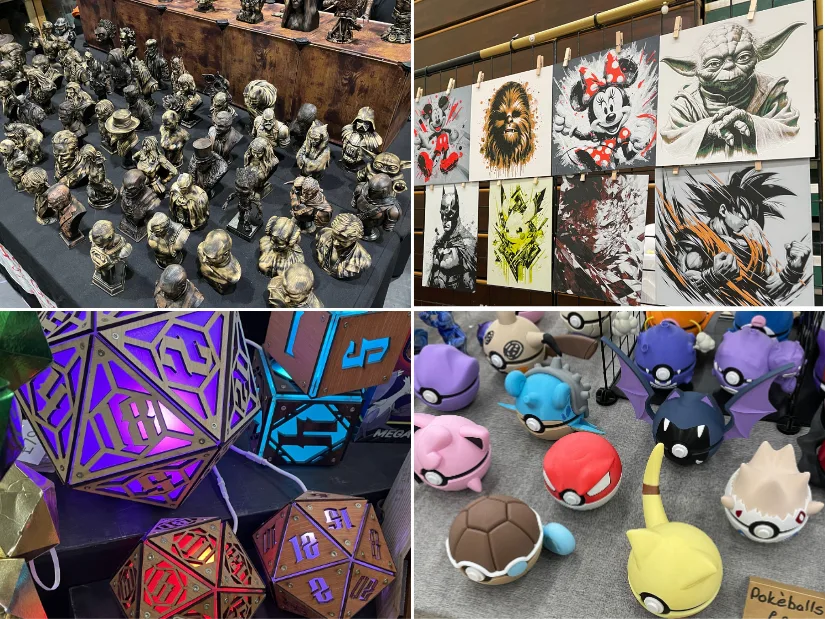
©3DWithUs – Photo: Max Funkner
What stood out to me was the sheer range of approaches. Some booths focused on minimalist or stylized prints, while others packed their tables with full shelves of 3D printed or laser-cut collectibles or even props.
Behind the Scenes: Exhibitor Booth
At Comic Con, some booths go far beyond just showcasing products — they become community hubs. I was pleased to meet several talented individuals at the Creality booth, where 3D printing was front and center. Cosplayer NMT_Cosplay (Nathan) was there in full Soldier Boy costume from The Boys, featuring 3D printed elements including his helmet, knife, and armor details. I also had the chance to connect with Morgan, the artist behind Printed Obsession, whose 3D printed fan art busts and models are well known in the community.
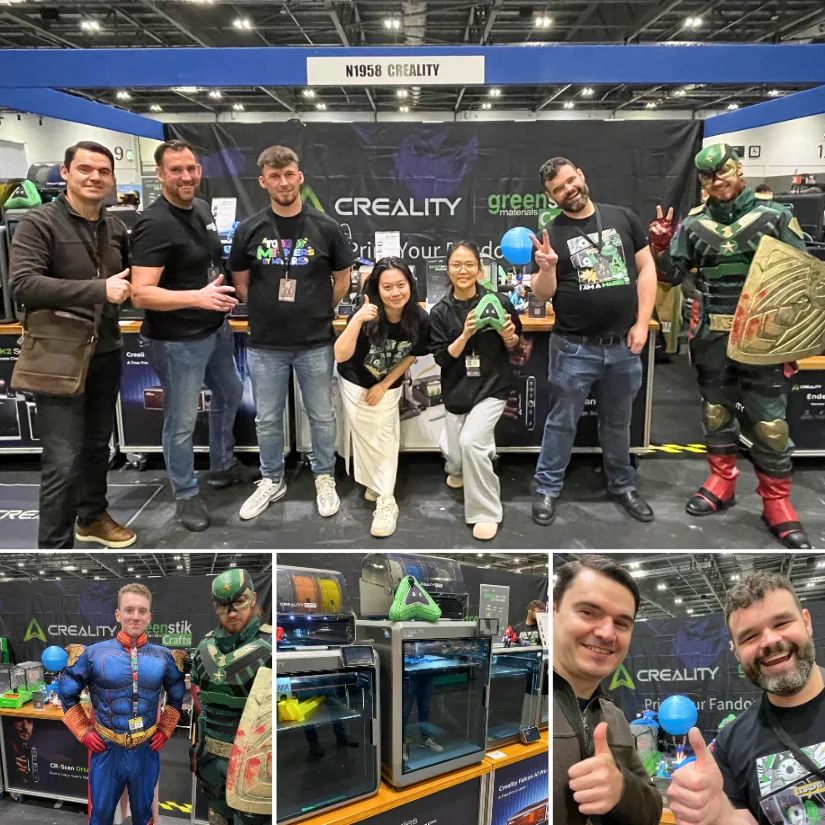
Photo: Max Funkner
As Creality puts it: Print Your Fandom. And they really leaned into that idea at the booth. Apart from showcasing a range of Creality machines, visitors could play a mini basketball game with 3D printed balls for a chance to win prizes. You could interact with a real cosplayer, talk to a fan art designer, and take selfies with them. This wasn’t just a booth; it was a hands-on reminder of how far 3D printing has come as a part of fan expression. This was truly a fun place to be, chatting with people who have 3D printing on their minds.
All this happened thanks to the big help from Creality’s reseller, MG Crafts, represented by Brett and Billy. They are active across the UK and Ireland, regularly exhibiting at events like this (the next is at the NEC Birmingham). At Comic Con, they looked after the booth setup, the technology side, and the live demonstrations, from 3D printers running on-site to scanners in action.
More About Cosplayers
If anyone ever feels shy about asking for a photo or selfie, Comic Con is the best place to shred that shyness. Most cosplayers are not only happy to pose — they see it as a reward for their hard work. These costumes take weeks or months to plan, print, sew, and finish. A photo request is often the moment that makes it all worth it. Across all the Comic Cons I attended, I met so many people happy to pose, smile, and celebrate their fandom with others.
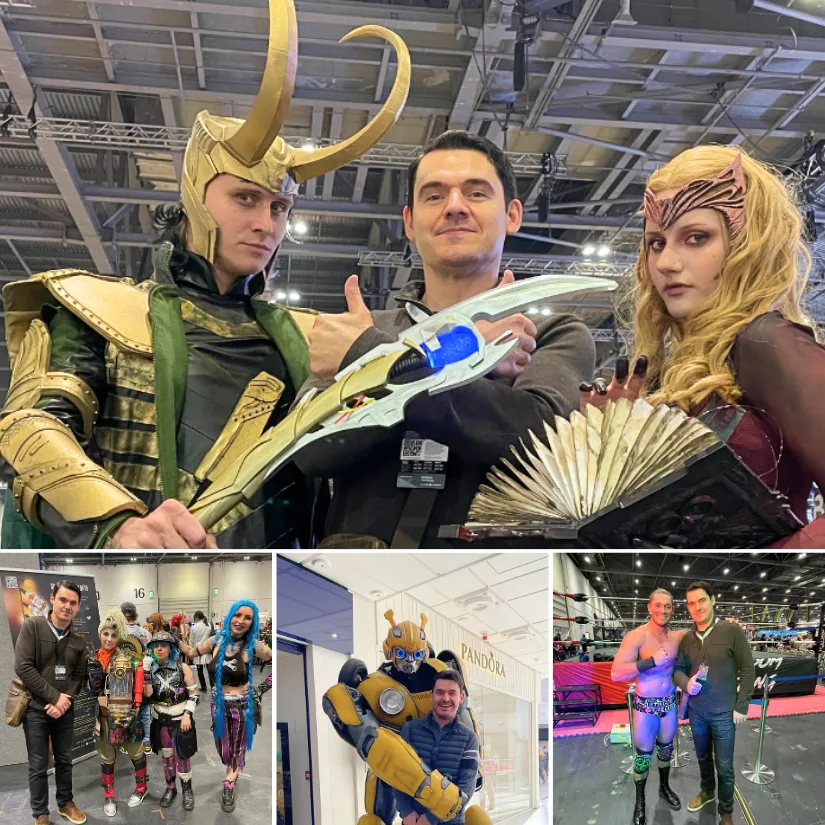
Photo: Max Funkner
Some cosplayers were so accurate, I had to do a double-take. The Loki (and Scarlet Witch) I met looked exactly like I remembered from the Thor films — costume, build, and even attitude. It’s easy to forget you’re not standing next to the actual actor when the quality is this high.
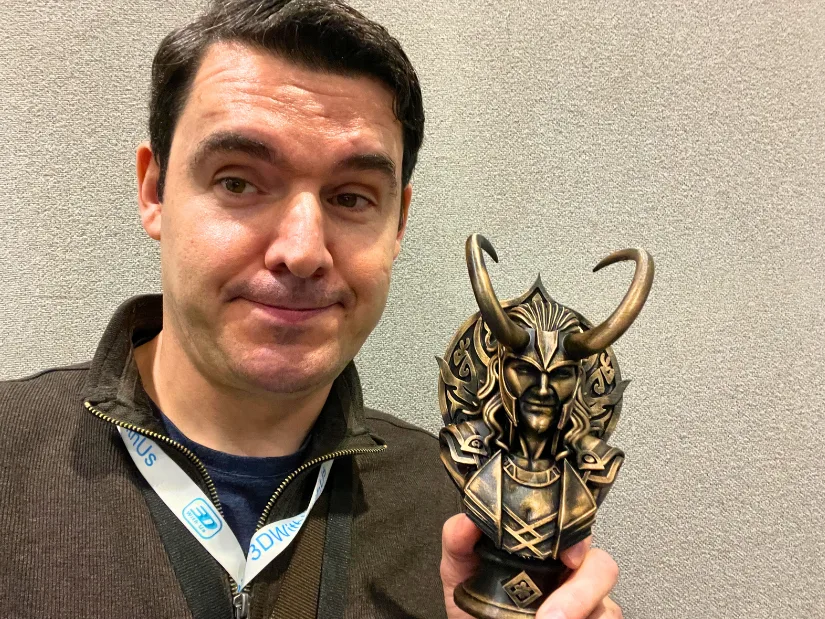
Photo: Max Funkner
I was so impressed with the cosplayers at MCM Comic Con that I felt the need to mark the moment with something physical. That’s how I ended up buying this 3D printed Loki bust. Funny thing is, I have plenty of 3D printers at home and could easily print one myself, but after taking a selfie with Loki, picking up the bust just felt right. It’s more than a collectible. It’s a memory.
Comic Cons: When and Where
Comic Cons happen all over the world and come in all shapes and sizes. In the US, events like San Diego Comic Con and New York Comic Con are major annual milestones, while the UK hosts massive gatherings such as MCM Comic Con in London and Birmingham. But beyond the headline events, there are also countless local and regional conventions worth exploring. These smaller shows may lack the scale of the big expos, but they often deliver a more personal experience, easier access to creators, and plenty of cosplay and merch highlights. If you are just starting out, a downscaled Comic Con in your town might be the perfect entry point.
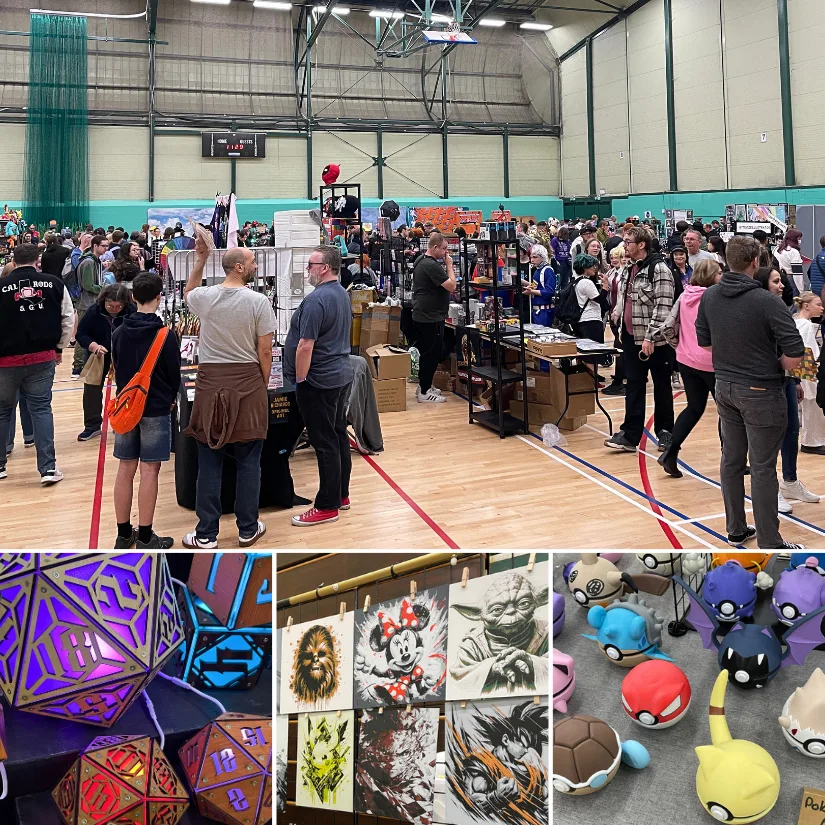
©3DWithUs – Photo: Max Funkner
Finding events is easy. A quick online search for ‘Comic Con near me’ usually reveals upcoming dates, or you can check dedicated convention calendars and local venue listings. Whether it’s a high-profile exhibition center or a humble community hall, every Comic Con shares the same energy: creativity, fandom, and the joy of being among like-minded people. No matter the size, the experience is almost always worth it.
Have questions? Feel free to ask in the comment section below.
For a wider discussion or to share your own Comic Con experience, join us in the forum:
Conclusion
Across multiple Comic Con events, it became clear to me that 3D printing is a reliable behind-the-scenes technology. From full costumes and intricate props to fan art collectibles and display setups, 3D printing is everywhere, and it is being used by passionate creators who want to bring their fandom to life in the most accurate way possible.
As a maker and observer, it was inspiring to see how approachable the technology has become. Even budget FDM and resin 3D printers are helping hobbyists, artists, and brands make a real impact. Whether you are printing at home or just admiring the results at an event, one thing is clear — 3D printing is a natural fit for the world of Comic Con.

